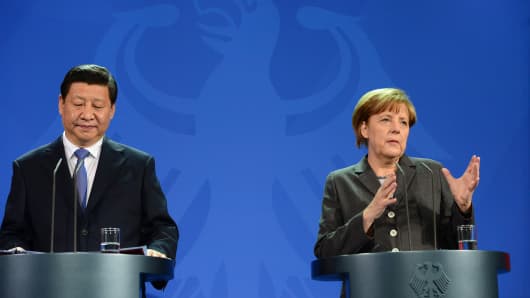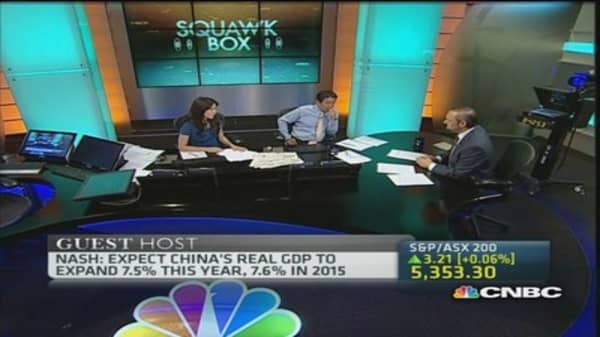In the first three quarters of last year (the latest data available), German exports to China were roughly unchanged from the year earlier, but imports from China were down by 5.4 percent, giving China a relatively small trade surplus of 3.3 billion euros.
Briefly put, there is nothing here that Germany should complain about.
But that is not what German press reports of Mr. Xi's visit would lead one to believe. According to these reports, Berlin was not content with the idea of making the economics the centerpiece of Sino-German relations. Germany apparently wanted to move the focus of the bilateral ties onto the political issues.
Read MoreChina gives U.S. nothing, but Germans get sweets
And that is where Mr. Xi smiled a lot from a "safe distance." It appears that he was not lectured about human rights and freedom of expression because the German president in his welcoming speech talked almost philosophically about these issues. But Mr. Xi's smiling got going when his German hosts wanted him to condemn Russia about events in Crimea.
German media reported that this was intended to drive a wedge between Russia and China in order to isolate Moscow. Berlin apparently thought that could be possible because Beijing's abstention to vote on the U.N. Security Council resolution about Crimea was seen as China's distancing from Russia.
Well, Mr. Xi declined to oblige. After all, he refused to condemn Russia in his conversation with President Obama a few days earlier during the nuclear summit in The Hague.
Read MoreCentral banks, China PMI to guide Asia markets this week
It will be interesting to see whether Mr. Xi's smiling from a distance had dented the idea of a Sino-German "dream team." Time will tell, but China has a long memory.
And, who knows, Mr. Xi's exceptionally warm, elegant and dignified welcome in France – including a glittering reception at the Palace of Versailles -- may have opened a new chapter in an old relationship that was dear to China's revered former leaders (and French students) like Chu Enlai and Deng Xiaoping.
I also hope that the U.S. will find a more constructive approach to Sino-American relations to correct an incredibly unbalanced trade account with China. Last year, China ran a $318.4 billion trade surplus with the U.S., representing nearly half of America's total trade gap. That compares with an estimated euro area trade deficit with China of about $100 billion.
Read MoreRoach: Is this the end of Chinese central planning?
It, therefore, seems that China is shopping in Europe with the money it earns on its U.S. trade. China is not even compensating that huge trade surplus with rising purchases of American debt. Last January, for example, China's holdings of Treasury securities were roughly unchanged from the same month of 2013, and were down 3.3 percent since last November.
Investment implications
China's European shopping spree is part of its process of economic reforms. China is acquiring the technology and the know-how it needs to conduct economic, financial, environmental and social welfare programs in a long march to Mr. Xi's "Chinese dream."
Investors can play this by betting on Chinese companies, or on their foreign partners and suppliers. European companies involved in multi-year and multi-billion China projects are perfectly safe and promising bets on Chinese economic development. For example, Peugeot-Citroen has become a partly owned Chinese company, and one of German luxury automakers is generating 50 percent more of its sales in China than in Germany.
Michael Ivanovitch is president of MSI Global, a New York-based economic research company. He also served as a senior economist at the OECD in Paris, international economist at the Federal Reserve Bank of New York and taught economics at Columbia.
Follow the author on Twitter @msiglobal9





